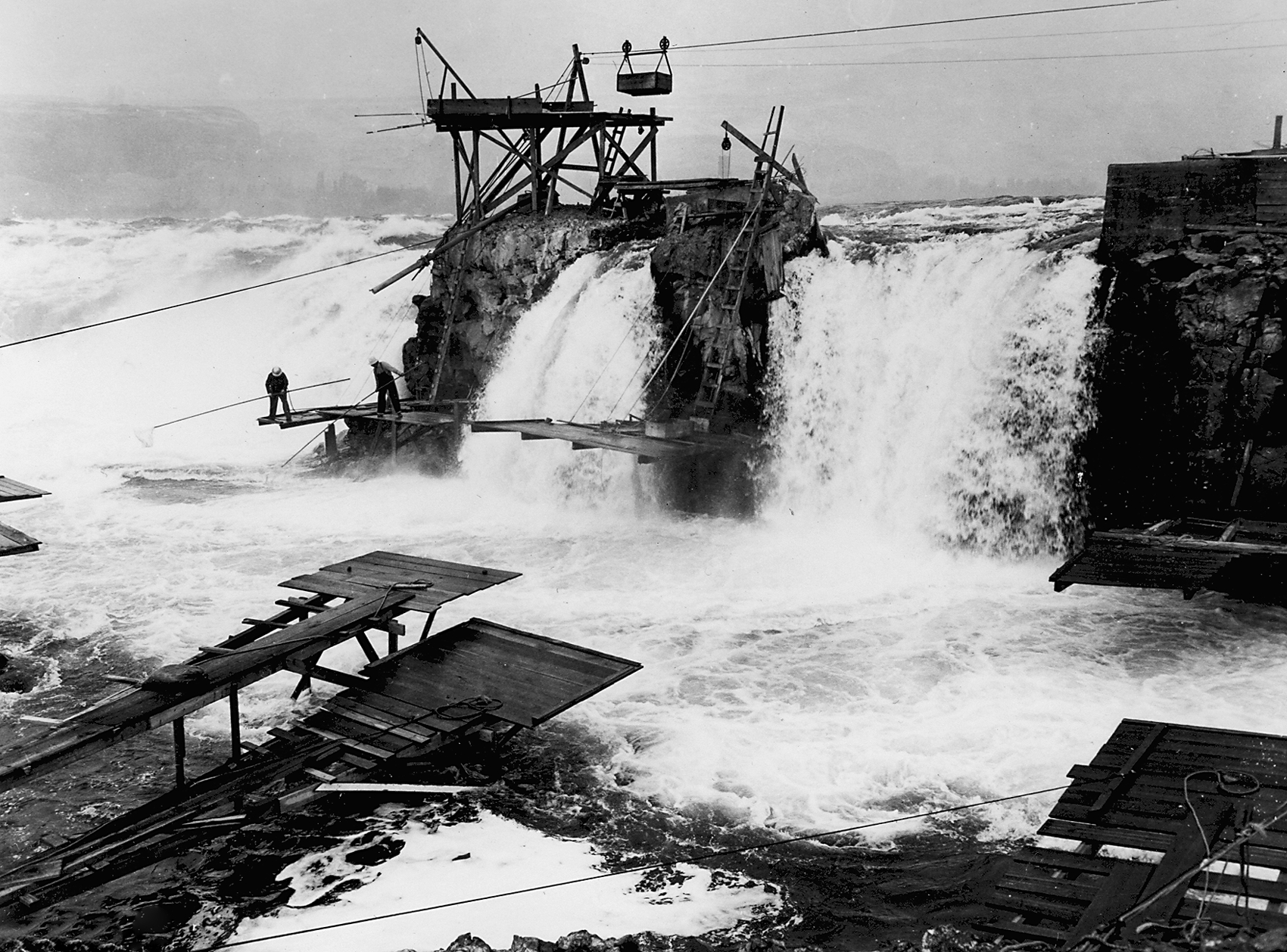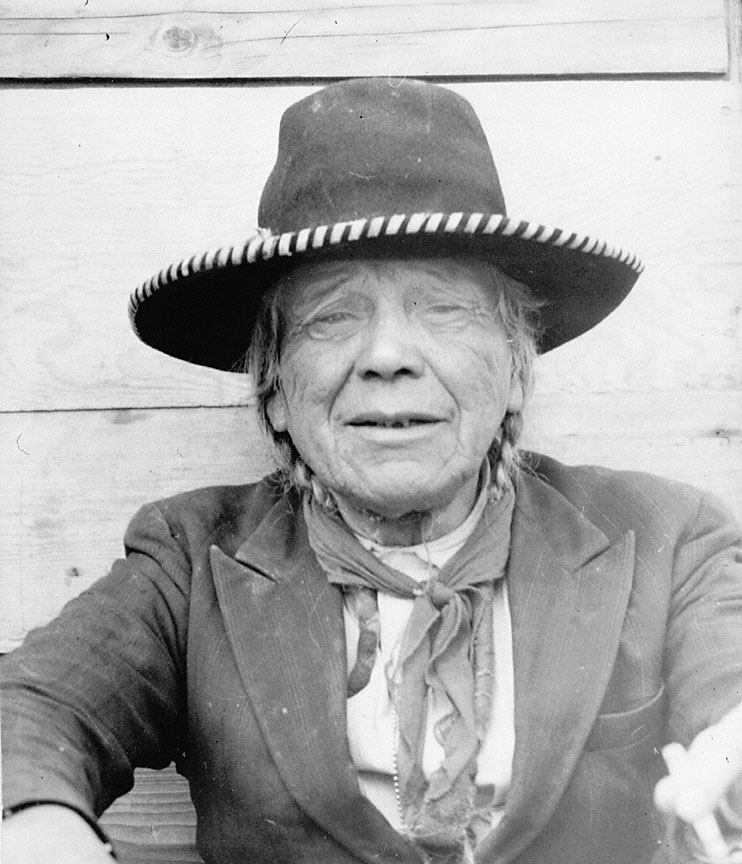Flora Cushinway Thompson (enrolled Warm Springs) was a spiritual and community leader who lived at Celilo Village on the mid-Columbia River. An accomplished speaker and advocate for Indigenous rights, she was a prominent and well-regarded leader in the Pacific Northwest who was familiar to both Native and non-Native people. Thompson lived at Celilo Village during the building of The Dalles Dam, which inundated the world-famous Indigenous fishery at Celilo Falls and the Long Narrows in 1957 and flooded part of Celilo Village, forcing the relocation of several families. During the 1950s, she was a prominent voice for the village at the height of the negotiations between the U.S. Army Corps of Engineers and citizens of the Yakama, Warm Springs, Umatilla, and Nez Perce Reservations and tribally unenrolled Native people.
Flora Cushinway was born on the Warm Springs Reservation in 1898 to Martha (Hu le) and Jim Cushinway (sometimes referred to as Cushny). One of five siblings who lived to adulthood, she was raised in a household that included her maternal grandmother, Pe las kow. Her father was a veteran of the Warm Springs Scouts, a unit attached to the U.S. Army and deployed to the Oregon-California state line in 1873 to fight the Modoc War under Captain Donald McKay. Jim Cushinway died in 1906, when Flora was a young girl.
Flora Cushinway entered the Warm Springs Reservation boarding school in 1902. She left in 1917 and several months later gave birth to her first child, Edgar Tewee. On December 17, 1921, she married Young Boise, whose wife had died. They had three children, one who died as a young child, and Flora helped raise Boise’s children from his previous marriage. Boise died from a stroke in 1939, and Flora married Timothy George, a leader in the Indian Shaker Church. She and her son Max Boise moved to the Yakama Reservation, where George was enrolled. Their marriage soon collapsed, although it took the couple several years to obtain an official divorce because of a bureaucratic mix-up.
In 1943, Flora married the religious and political leader at Celilo Village, Chief Tommy Thompson, after his grandchildren urged the two into a relationship. Together, the couple attended to the spiritual needs of Indigenous people in the mid-Columbia region; hosted the annual salmon ceremony, which attracted thousands of guests to Celilo Village; and frequently spoke to Oregon audiences about Native issues. Flora Thompson was “a woman of rare distinction and intelligence,” author and educator Martha Ferguson McKeown said, and her home was central to the Celilo Village community, “a busy place, with much coming and going.”
Already a leader in her own right, Flora’s marriage to Tommy Thompson elevated her authority among the region’s Native and non-Native people. She took on the role of representative of Celilo Village, and her marriage thrust her into the public consciousness of people throughout the region. The Oregonian and the Oregon Journal covered events at Celilo Village and reported on the annual Salmon Ceremony, where Flora Thompson was an organizer and host.
As Tommy Thompson faced increasingly serious health issues during the 1950s, Flora Thompson’s public role intensified. In 1956, the Oregonian published a photograph of Flora Thompson and Mabel McKay, the wife of Oregon Governor Douglas McKay, headlined “Leading Ladies Meet.” Thompson also appeared in two popular children’s books written by Martha McKeown, who along with her husband Archie were family friends. The couple had unusual access to Celilo Village, which Archie McKeown captured in photographs that included portraits of the Thompsons and other residents.
Martha McKeown wrote about the Thompsons and their extended families in Linda’s Indian Home (1956) and Come to Our Salmon Feast (1959), which were illustrated with Archie McKeown’s photographs. Martha McKeown also invited the Thompsons to speak at the many clubs and women’s organizations to which she belonged and at the high school where she taught. Because of the press coverage of the construction of The Dalles Dam, the publicity about McKeown’s children’s books, and regional speaking engagements, Flora Thompson became well known to non-Native Oregonians.
Until 1957, the Thompsons often spoke out against the threat The Dalles Dam posed to Celilo Falls and the Long Narrows, where Native fishers had gathered for thousands of years. Chief Thompson refused to accept the monetary compensation the federal government begrudgingly offered Celilo Village residents to offset the dam’s impact on the Native fishery. When Thompson died in 1959, Flora believed that The Dalles Dam, completed two years earlier, had contributed to his death. She used the money from the federal government, which she accessed with the help of friends, to host a multiday funeral ceremony for her husband that was broadcast by Portland-area television station KGW and narrated by journalist Tom McCall, who would serve as governor of Oregon from 1967 to 1975. After Tommy Thompson’s death, Flora Thompson continued to advocate for Indigenous rights on the Columbia River and at Celilo Village.
Flora Thompson died on March 3, 1978. She was honored with an elaborate ceremony and buried on the Warms Springs Reservation.
-
![]()
Flora Thompson.
Oregon Historical Society Research Library, CN 018928
-
![]()
Flora Thompson and Chief Tommy Thompson, Celilo Village, 1955.
Oregon Historical Society Research Library, OrgLot1284_2451_2 -
![]()
Flora Thompson with Charlie Tuitalkin, Marshall Dana, and Tommy Thompson, Chiefs Island, 1949.
Oregon Historical Society Research Library, CN 018928
-
![]()
Chief Tommy Kuni and Flora Thompson, Celilo Village, 1949.
Oregon Historical Society Research Library, 018094
-
![]()
Flora Thompson with her granddaughter Linda George, 1956.
Oregon Historical Society Research Library,Orhi 68315
-
![]()
Flora and Tommy Thompson's home, Celilo Village.
Oregon Historical Society Research Library, CN 07245
-
![]()
Flora Cushinway and Chief Tommy Kuni Thompson, 1955.
Oregon Historical Society Research Library, Org. Lot 1284 -
![]()
Martha Ferguson McKeown, Chief Tommy Thompson, and Flora Cushinway Thompson, 1956.
Oregon Historical Society Research Library, Org. Lot 1284
Related Entries
-
Celilo Falls
Celilo Falls (also known as Horseshoe Falls) was located on the mid-Col…
-
![Martha Ferguson McKeown (1903-1974)]()
Martha Ferguson McKeown (1903-1974)
Author, historian, teacher, Martha McKeown, a third-generation Oregonia…
-
![The Dalles Dam]()
The Dalles Dam
The United States Army Corps of Engineers constructed The Dalles Dam be…
-
![Tommy Thompson (1864?–1959)]()
Tommy Thompson (1864?–1959)
Tommy Kuni Thompson served as the headman of Wyam (an Ichiskiin Sinwit …
Related Historical Records
Map This on the Oregon History WayFinder
The Oregon History Wayfinder is an interactive map that identifies significant places, people, and events in Oregon history.
Further Reading
Barber, Katrine. In Defense of Wyam: Native-White Alliances and the Struggle for Celilo Village. Seattle: University of Washington Press, 2018.
McKeown, Martha Ferguson. Linda’s Indian Home. Portland, Ore.: Binford & Mort, 1956.
_____. Come to Our Salmon Feast. Portland, Ore.: Binford & Mort, 1959.
Meanus, Linda. My Name Is Lamoosh. Corvallis: Oregon State University Press, 2023.











